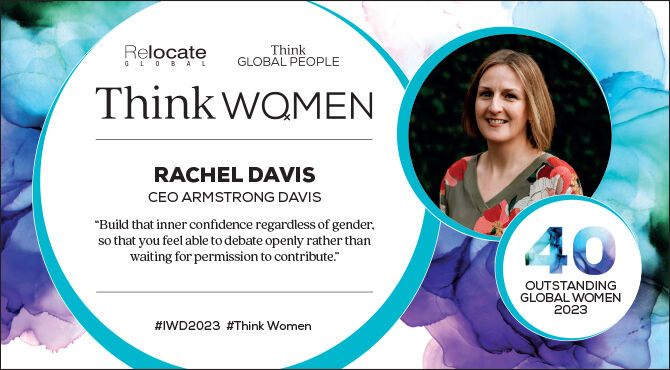Think Women’s 40 Outstanding Global Women 2023 - Rachel Davis, Armstrong Craven
As part of our Think Women Outstanding Global Women series, we spoke to Rachel Davis,
co-CEO of Armstrong Craven, a global talent mapping and pipelining partner for scarce and senior positions. Rachel is passionate about encouraging women to move into senior leadership roles and fully understands the challenges many women face when climbing the corporate ladder. Rachel is one of the inspirational leaders we are celebrating for International Women’s Day 2023.

Changing mindsets
From the perspective of talent search, she says the effects of the pandemic – a growing talent shortage due to the Great Resignation, demand for more flexible working and an increasing need for digital-savvy managers - have driven more employers to consider potential candidates from outside their niche industries.“Businesses overall have appreciated the greater access to talent that flexible working brings,” she says. “There’s also the fact that the talent itself is demanding this flexibility now, although during lockdown the benefits of flexible working may well have been offset by the challenges women faced around home schooling and juggling family life. Women with school age children may decide to step out of corporate life and run their own business or become consultants in order to maintain flexibility during those school years.”Executive search organisations are now having conversations with boards about how finding the best candidate for the role might involve a mindset change.“As an organization we are helping businesses to remove the reactivity involved in an executive search, which by definition is reactive because there's a hole in the in the organization and you are scrambling to fill it,” she says. “We were finding that the ‘best’ candidate in terms of coming forward first is often male. Our experience over many years is that it takes double the amount of outreach attempts to have a woman engage with you for a potential role.“Then bias creeps in, because the first interviews will have been all with men, and therefore by the time the kind of women make it to the shortlist, assumptions may already have been made.”To remedy this, Armstrong Craven starts by engaging the female candidates first, in order to ensure a more level playing field.“It comes back to some of the research around a woman only applying for a role if she thinks she might fulfil 90% of the criteria, compared to 60% for men. Then there is the imposter syndrome, which does also affect men.”For this reason, companies are now being urged to look at candidates from outside their industry sector who have the transferable skills, experience of leading through change, and the ability to influence that a modern leader needs. The old leadership style of ‘command and control’ is being replaced by one of purpose and collaboration, and all leaders, male or female, need to be able to demonstrate high EQ, empathetic leadership styles and the ability to communicate and influence.“Women can be and tend to be more empathetic and tend to be more collaborative than men. If you want that kind of leadership skillset in your business – and you should – then it is a double positive to appoint a woman.“I'm a business person first and foremost. The second you label yourself as a woman, you are in a potentially different mindset. Your opinions are interesting and they count and it doesn't actually matter that you're saying them as a woman. Build that inner confidence regardless of gender, so that you feel able to debate openly rather than waiting for permission to contribute.”Rachel’s tips for success:
- Understand your own natural leadership style
- Do your absolute best not to put your own gender front of mind
- Seek out mentors
- Don't be afraid to put your opinions out there and take real strength from the fact that the world has changed
- Be transparent about your decision making and communicate that to others
- When people feel included and listened to they are much more likely to understand and support the decisions you have made
Back to Think Women’s 40 Outstanding Global Women 2023

Sign up now at events@relocatemagazine.com and subscribe to our newsletters to find out more.
Subscribe now to Think Global People magazine and read more from Marianne Curphey on women leaders and Ruth Holmes on the talent agenda for 2023 in the brand-new winter issue

Subscribe to Relocate Extra, our monthly newsletter, to get all the latest international assignments and global mobility news.
Relocate’s new Global Mobility Toolkit provides free information, practical advice and support for HR, global mobility managers and global teams operating overseas.
©2026 Re:locate magazine, published by Profile Locations, Spray Hill, Hastings Road, Lamberhurst, Kent TN3 8JB. All rights reserved. This publication (or any part thereof) may not be reproduced in any form without the prior written permission of Profile Locations. Profile Locations accepts no liability for the accuracy of the contents or any opinions expressed herein.






























